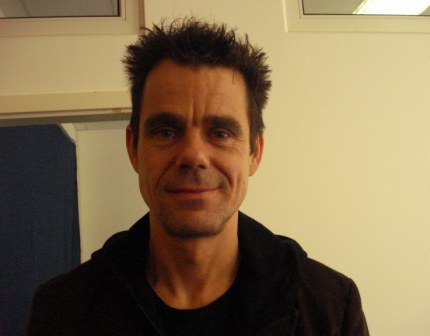
For anyone curious to see how Germans reflect on Germany today, the new film Deutschland 09, composed of thirteen clips by thirteen German directors, is to be recommended. As director Tom Tykwer--one of the organizers of this project--avowed himself: "For a compilation of shorts, this worked out well. The majority are worth seeing." It's true: most short film extravaganzas--such as Paris, Je t'aime (uk!)--are a lumpy bunch, with only one or two gems, but this one has at least five that manage to achieve depth in ten minutes.
Tykwer's own short was a personal favorite: a clever high-tech look into the life of the modern anonymous businessman today, who goes around the world on meetings, only to find the same splashy Marriott and the same Starbucks everywhere--from Tokyo to Cairo--until his eyes go blurry with alienation. "Sure, it is not specifically German," commented Tykwer. "And that is German. I realized that with all the possibilities we all have, it is hard to come up with difference. We in Germany are very energetic about the globalized aesthetic."
A real gem is Dominik Graf's photo-spread on Berlin architecture, "The Road We Don't Walk Together", a rather Chris Marker exercise (stills become movement) revealing how the new modern complexes, characterized by light and transparency, are not transparent at all. They hide the past, the poverty and the marginality of the small-windowed residences they have replaced. Supposedly these architectural innovations were designed in the l960s to provide an "emotional" experience, the voice-over comments, but they are emotional in the Nazi sense: "everything disappears."
Not surprisingly, a sense of a complicated history--and confusion on how to evolve--is a subtext of several of these shorts. The stellar nod to this theme is Romuald Karmakar's interview with an Iranian pornographer who happily leads us around his shop to give a "historical" overview of the development of the porn trade in his forty years of business. Grateful to Germany to providing him this wonderful new life in Europe, the Persian immigrant proudly speaks about the different kinds of sexual perversions that have taken place on his couches--including one rather unmentionable activity with a tampon. With nostalgia, he sits on his favorite leather couch and fondly remembers the hundreds of prostitutes he himself had enjoyed, right on these cushions. Pointing with distaste at the couch's fellow, he says: "Now that couch has no good memories". He repeats: "Uh. That couch I really don't like."
My fellow German journalists most appreciated a short lampooning a recent real event in Germany, where conservatives got upset with the change of the layout (from Gothic to New Times) of the newspaper the Frankfurter Allgemeine Zeitung. In this clip, an outraged industrialist--echoing the conservative sentiment that the Gothic is "the German soul"--has his truck drivers personally buy out the entire lot of newspapers to burn them in a bonfire, to protest this loss of Germanness.
One frightening film--which I thought was science-fiction until I realized it was based on a real event--is about noted professor and political activist, Andrej Holm, who was arrested and put in prison a few years ago for supposed terrorist leanings, although he had done nothing illegal. Even more shocking, we learn that the German government apparently directed a surveillance operation (phone taps, email raids, spying) not only of him, but of thousands of his associates, at an exorbitant cost to the state. "This is going back to the Reichstag," director Hans Weingartner avowed, his voice trembling with anger. "You see how dangerous these anti-terror laws are. Now there is a law that the government can observe people and start criminal prosecution without a judge or state attorney."
He continued with outrage, "Political activists are being treated as terrorists instead of like the heros they are. Just before G8, forty offices were raided in Germany, for suspicion of funding a terrorist group. What is going on? The Minister of the Interior Schäuble is destroying the Constitution."
A journalist queried, with light irony, whether Weingartner was not afraid that he too--after this film--would be under surveillance?
----
So what is the state of Deutschland today? Collectively (with a few flops, such as a regrettable Susan Sontag spoof and an unwatchable clip about grotesque operations in a hospital), the films are brainy self-reflections on the uneasy alliances between politics and modernity. As for anything more specific to connect the clips, it is hard to say, as the subject matter ranges from architecture to Guantanamo.
Tykwer had his own answer to what unites this diagnosis of "Germany". "What unites the films is gesture," he said, lifting his hand. "They all take the same doubtful, cautious attentiveness towards the place, and this is what binds the movies."
The director's own personal favorite? Perhaps Graf's poetic piece on modern architecture. He applauded this "fascinating idea of pseudo-transparent architectural complexes; they can see us and we can't see them. The invisible sources of power."
 Tom Twyker
Tom Twyker
